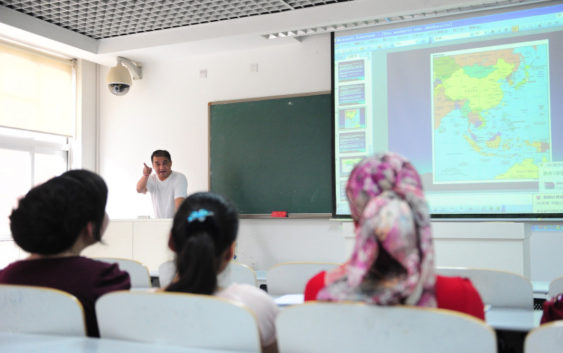Ilham Tohti’s Sakharov Prize Will Drive Beijing Crazy

The imprisoned Uighur economist represents an entire people under attack by China.
The Uighur economist Ilham Tohti, currently held in a Chinese prison, has just been awarded the 2019 Sakharov Prize from the European Parliament. But who is he, and what does it mean? Foreign Policy has you covered.
What’s the Sakharov Prize?
Officially the Sakharov Prize for Freedom of Thought, the prestigious human rights award was founded in 1988 in honor of the Soviet dissident and scientist Andrei Sakharov and is awarded by the European Parliament, the European Union’s legislative body. It usually goes to political dissidents and intellectuals, with a wide geographic sweep.
So who is this guy?
Right now, like many previous Sakharov recipients, Tohti is a prisoner, held by China on trumped-up charges. Before he was arrested in 2014, Tohti was a leading Uighur intellectual best known for founding the website Uighur Online. A Beijing-trained economist and university lecturer, he looked to strengthen the position of the Uighurs—a mostly Muslim minority group in China’s western region of Xinjiang—inside the Chinese system, calling for greater regional autonomy and enforcement of anti-discrimination laws, as well as acting as a critic of repressive state measures in Xinjiang.
Why was he arrested?
In the 2000s, there was some space in the Chinese system for local activism and minority work and even limited criticism of government policies. In Xinjiang, that began to change after the July 2009 riots in Urumqi, in which a mob of young Uighur men killed dozens of civilians, mostly Han Chinese—followed by harsh retaliatory violence by both the People’s Armed Police, China’s paramilitary forces, and Han settlers.
That made Tohti’s position much riskier, and he was detained for the first time shortly after the riots before being released on Aug. 23, 2009, thanks in part to U.S. government pressure. In the meantime, government policy in Xinjiang became far harsher, violence worsened, and the state began to see any advocacy of Uighur culture as inherently risky. At the same time, a wider government crackdown on freedom of speech took place under new Communist Party leader Xi Jinping’s direction. Tohti’s arrest—along with several other members of his intellectual circle—in 2014 was the final blow to any notion that the Uighurs could advocate for themselves within China.
The actual charges focused on separatism, spreading rumors, and criticizing the government. Even the attempt to tie Tohti to supposed terrorist groups such as the East Turkestan Islamic Movement (in reality a brief-lived group of the mid-2000s but in Chinese propaganda a perennial bugbear) was fairly desultory; his arrest was intended to send a message that any kind of dissent in Xinjiang was unacceptable. Since then, the conditions of the Uighurs have only worsened.
What’s happening with the Uighurs?
The Uighurs are the targets of what advocates describe as a “cultural genocide,” an attempt to destroy their language, culture, and existence as a people that includes pulling almost all Uighur-language works from bookshelves, forced indoctrination programs, sweeping arrests of Uighur intellectuals, and, most notoriously, the creation of detention camps to hold over a million people. Tens of thousands of children, at least, have been stripped from their imprisoned parents and are being held in Chinese state-run orphanages. The United States recently imposed sanctions on Chinese surveillance firms for their role in the atrocities.
Growing global awareness of the repression is probably behind Tohti’s award this year; the prize’s website states: “The Uyghur people have been subjected to unparalleled repression by the Chinese government in recent years as a result of their unique ethnic identity and religious beliefs. Since April 2017, over 1 million innocent Uyghurs have been arbitrarily detained in a network of internment camps, where they are forced to renounce their ethnic identity and religious beliefs and swear loyalty to the Chinese government.”
How will the Chinese Communist Party react to the prize?
The last time the prize was awarded to a Chinese dissident, the activist Hu Jia in 2008, the response of the Chinese Communist Party (CCP) was fairly muted. But those were very different times: China was concerned with its image around the Beijing Olympics, and limited reform still seemed like a possibility at home. Under Xi, paranoia around any foreign influence or connection has become much sharper, and officials are under far more pressure to react strongly or risk becoming targets themselves. Beijing is extra sensitive over Xinjiang, where it has been running a global propaganda campaign—especially enlisting Muslim countries—to attempt to defend its atrocities.
That means the prize might seriously worsen China-EU relations. The CCP is rarely able to grasp that such prizes aren’t directed from the top. When the Nobel Peace Prize went to the imprisoned writer Liu Xiaobo in 2010, it ruined Norwegian-Chinese relations for six years. The Sakharov doesn’t hit as sore a spot as the Nobel—the CCP is permanently bitter that the first Nobel Prize awarded to a Chinese resident went to a dissident—and the EU is a much bigger deal than Norway. But the domestic politics are far worse than they were in 2010. So at a minimum, expect a tantrum in state media, yelling at diplomats, and a much tougher time for trade deals and the suchlike in at least the next few months.
SOURCE: ForeinPolicy